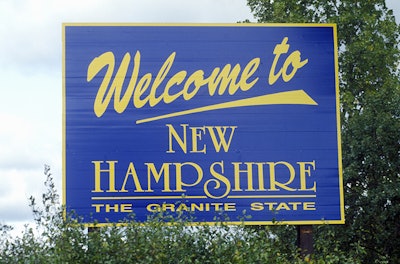
New Hampshire has been slow to accept changes to marijuana policy, but Marijuana Policy Project’s (MPP) New England political director, Matt Simon, says the state is finally making progress in registered patient counts and expanded condition lists, decriminalization and a chance at adult-use legalization.
“New Hampshire’s certainly lagging behind the rest of New England, but they’re finally moving forward,” Simon says. “This is our best year in the legislature, finally passing decriminalization and making the medical cannabis law a lot better and … they’re finally studying legalization, so good things are happening. At least they’re talking about it.”
Here are some items to note about cannabis in the Granite State.
1. The current medical marijuana program is limited, but improving.
New Hampshire legalized medical cannabis in 2013 and has since implemented the Therapeutic Cannabis Program, which permits four alternative treatment centers, or vertically integrated dispensaries, to operate.
As of Oct. 27, there were 4,382 patients on the registry and 303 caregivers, according to notes from the Nov. 6 meeting of the state’s Commission to Study the Legalization, Regulation and Taxation of Marijuana.
“Some people, thousands, are actually benefiting from this finally, crawling New Hampshire out of the dark ages,” Simon says. “It’s all been very positive this year in the legislature.”
He says patients and their doctors have testified before lawmakers, helping convince them to add qualifying conditions such as moderate-to-severe chronic pain and post-traumatic stress disorder (PTSD) to the program.
“We’re actually pretty happy with the qualifying conditions now,” Simon notes. “It went from being pretty bad to suddenly being, with [the addition of] moderate-to-severe chronic pain, pretty good. [That] is the most important addition of all, in my opinion, given the opioid crisis. PTSD was a big one, as well, but that was the biggest problem before, that it was restricted to severe pain and that pain had to be connected to a specific diagnosis that was listed in the law, so it was really restrictive.”
If anything, Simon says, he would like to see the program become more accessible with additional dispensaries and home cultivation.
“Patients would like to be able to grow their own and they would like to have more access through dispensaries,” he says. “Hopefully … that would drive down costs—patients would like to see things be cheaper and more accessible. The dispensaries must pay high fees to the state and it’s a very small patient population that they’re drawing from, so it’s tough to break even.”
2. The study commission was largely prohibitionist, but has gained balance.
Simon says the state’s Commission to Study the Legalization, Regulation and Taxation of Marijuana is comprised mostly of people who have not been supportive of marijuana policy reform, but that it recently gained a few members who have been supportive of making cannabis legal for adult-use. The original bill to establish the commission mandated that MPP would have representation in the group, but the state senate removed that stipulation.
The final bill laid out which department heads could appoint committee members, and the police chief, attorney general, Medical Society and others all have a representative.
“The governor appointed a public member, [former state Rep. Joe Hannon], who balanced things out quite a bit, and the Bar Association appointed an attorney, [Paul Twomey], who’s favorable, so there’s at least some balance and a discussion,” Simon says.
3. The study commission is open-minded and gaining a foundation of knowledge.
The committee is making an effort to hear testimony, according to Simon. Simon himself testified Nov. 27, and the committee is planning to hear from experts in western states that have legalized adult-use.
“They seem to be approaching it in a pretty open-minded way,” Simon says. “I think they’re sincerely interested in trying to set their biases aside, as the chairman, to his credit, urged everybody to do at the first meeting.”
The committee has met three times so far. The first meeting was organizational, Simon says, and the committee heard a report on the Therapeutic Cannabis Program at the second meeting. At the third meeting, they heard testimony from Simon, the banking department and the Department of Agriculture, Simon says.
4. Decriminalization is finally a reality.
Simon has been working on passing decriminalization in New Hampshire since 2007, he says, and the House has passed decriminalization bills eight times between 2008-2016, although the legislation was always shot down before it was signed into law.
The state’s past governors have generally not been friendly toward policy reform, Simon says, with former Gov. John Lynch (D) vetoing medical cannabis twice in 2009 and 2012, and his successor Gov. Maggie Hassan (D) gutting the medical law before ultimately signing it into law in 2013.
In July, newly elected Gov. Chris Sununu (R) finally signed a bill to decriminalize possession of small amounts of marijuana. It took effect in September.
“It took Gov. Chris Sununu to support [decriminalization] and sign it and also sign chronic pain and PTSD and the study commission, and just set a different tone on the issue,” Simon says.
5. Legalization has a chance.
Last month, the House Criminal Justice and Public Safety Committee recommended against House Bill 656 to legalize the personal use of cannabis for people 21 and older and create a licensing system to allow businesses to sell marijuana, which would be taxed by the state. Since then, however, Simon says marijuana-friendly Gene Chandler (R) has been appointed as the new House Speaker to replace cannabis opponent Shawn Jasper (R), and the bill could have a chance at passing in the House when the legislature reconvenes in January for a vote.
The House must vote on all bills, Simon says, and the House has overturned the Criminal Justice and Public Safety Committee many times in the past.
“I actually think there’s a good chance that the House, when it convenes in January, will definitely have a robust debate on this bill,” he says. “I think they’ll overturn the committee and pass probably an amended version of it, which will not succeed in the Senate, but I think it has a good chance of passing the House and it would have to get a hearing in the Senate and would have … an uphill climb.”
2018 will be an election year in New Hampshire, meaning there will be an opportunity for new blood in the office, and a refreshed debate on marijuana policy, Simon says.
“I’ve said all along I don’t expect [the committee] to recommend full legalization. It would be incredibly difficult,” he says. “I’m more interested in how it will play out as an election issue … and how the issue plays out in elections will probably be more important than a yea or a nay from this particular commission.”
The study commission will conclude and present its findings in late 2018, and Simon says it will have an opportunity to weigh in on details if it makes a positive recommendation.
Top image: © Americanspirit | Dreamstime.com


























